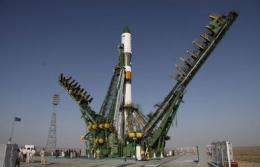Russia delays next manned space flight

Russia on Monday delayed its next manned mission to the International Space Station (ISS) by at least a month after an unmanned cargo vessel crashed into Siberia instead of reaching orbit.
The head of Russia's manned spaceflight programme also warned that a significantly longer delay would force the six people on board the station to abandon the orbiter due to problems of fatigue and supplies.
"We expect that the next manned launch will take place in late October or early November -- not earlier. That is our plan," the RIA Novosti news agency quoted Russia's manned spaceflight programme director Alexei Krasnov as saying.
The launch had initially been scheduled for September 22.
Krasnov said the return to Earth of the first three of six crew members on board the ISS has also been pushed back from September 8 until September 16 on one of two Soyuz spacecraft docked at the space station.
"If for some reason we fail to send up the next crew by the end of November, we will have to study all the available options, including one of leaving the station unmanned," Russian news agencies quoted Krasnov as saying.
"But we will do everything possible to make sure that it is not left unattended," Krasnov added.
A US space agency official, meanwhile, said the ISS crew would be evacuated if the Soyuz mission is not launched by mid-November, leaving the orbiting space station to be operated from the ground.
"Assuming no significant anomaly... we can operate the ISS indefinitely without a crew on board," said NASA's ISS manager Michael Suffredini.
The NASA official said the space agencies "prefer not to operate the ISS without a crew on board for an extended period of time."
NASA has preferred to keep to ISS manned at all times so that crew members could continue carrying out their experiments.
Officials from both sides said the international crew on board the ISS has enough basic supplies and oxygen to last at least through November.
"I want to emphasize that the crew on board of the ISS is safe," Suffredini said.
"We have plans to operate the ISS either with three crew (members) or no crew. The impact of course is the amount of research we get done."
Russian officials are concerned about manned missions because the Soyuz-FG has the same third-stage motor as the one in the Soyuz-U rocket that failed to put the Progress craft in orbit on August 24.
It marked the first time the Progress cargo carrier had been lost on a mission since it was first fitted on a Soyuz for its maiden flight in 1978.
Russian space agency Roscosmos is now conducting a check of all its rockets after the disaster, which followed three other failed launches of satellites since December in an unprecedented catalogue of accidents.
Krasnov said Roscosmos would like to send at least one Soyuz rocket to space before the next manned flight to make sure that the experts had narrowed down the root of last week's problem.
Both Russian and US officials now think the problem involved a faulty fuel pump that prevented full ignition of the third stage propulsion system.
An unnamed Russian space official separately told Interfax that Roscosmos would prefer to carry out two unmanned Soyuz flights by December -- a schedule that appears to conflict with one set by NASA.
"At the moment, we are studying the option of sending the first spacecraft in November and the second in December," the Russian official said.
The crew of Russians Andrei Borisenko and Alexander Samokutyaev and NASA astronaut Ron Garan went up to the ISS in March on board a historic flight honouring the 50th anniversary of the first voyage of space pioneer Yuri Gagarin.
This month's failed launch was a spectacular blow for Russia after it had proudly become the sole nation capable of taking humans to the ISS after the July withdrawal of the US space shuttle.
(c) 2011 AFP



















